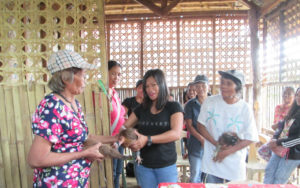Jennifer Ryu is a recipient of UUCSJ’s Ministerial Sabbatical grant which offer rich encounters with historic and emerging expressions of our Unitarian faith in a different cultural context.
Today I’m packing up to leave Cebu City which has served as home base for “part one” of my sabbatical journey to the Philippines. During these first two weeks, I travelled with Rainer Lucero, UUSC coordinator for local projects. We visited over eleven communities affected by typhoon Yolanda in November 2013, traveling by planes, boats, vans, trucks, and by foot to reach these remote areas. Everywhere we went, I witnessed the resurrective power of community. This was the kind of people power that I had hoped to foster in the congregation I just left.
In June, 2015, I said goodbye to a church that I had served for nearly a decade. Although the ministry was going well, and I could have easily stayed many more years, my soul was urging me to move on. Since I had no idea where I was supposed to go, I decided to spend this year remembering what called me to ministry in the first place.
After so many years living in the bubble of suburban America and the bubble of American Unitarian Unitarianism, I needed a big change in perspective. Thanks to the UU College of Social Justice Program Grant For Ministerial Sabbatical Program, I was able to design a trip that exposed me to both the UUSC typhoon relief work and the UU Church of the Philippines–two different expressions of Unitarian Universalism in the world.
The rural communities we visited are not unlike churches. Members of these voluntary associations often came together as households, so they are naturally multigenerational. They join their financial resources for the good of the community and support one another in times of need. Not only do they build economic power through their organization, but also political power. Some are organized by livelihood (farmers and fisherfolk) or identity (LGBT and indigenous peoples and women); others are based on village geography.
The work that the UUSC has been doing in the Philippines goes way beyond relief work. They are using their networks and expertise to build up institutions–those local, grassroots groups of people who are too often ignored by their own governments and larger NGOs. When individual women organize, educate themselves, and seek official recognition from the government, they can then exercise their power to shape municipal budgets, policies and laws.
As I look forward to coming home in a few more weeks, I am thinking about the marginalized people in my own neighborhood…where is their local power? How are they organizing themselves into voluntary associations that convey benefits and also require high engagement and participation?
I carry these questions with me as I board the bus to Dumaguete, headquarters for the UU Church of the Philippines, where I will meet with college students and make a presentation to the annual UU Women’s Conference.


